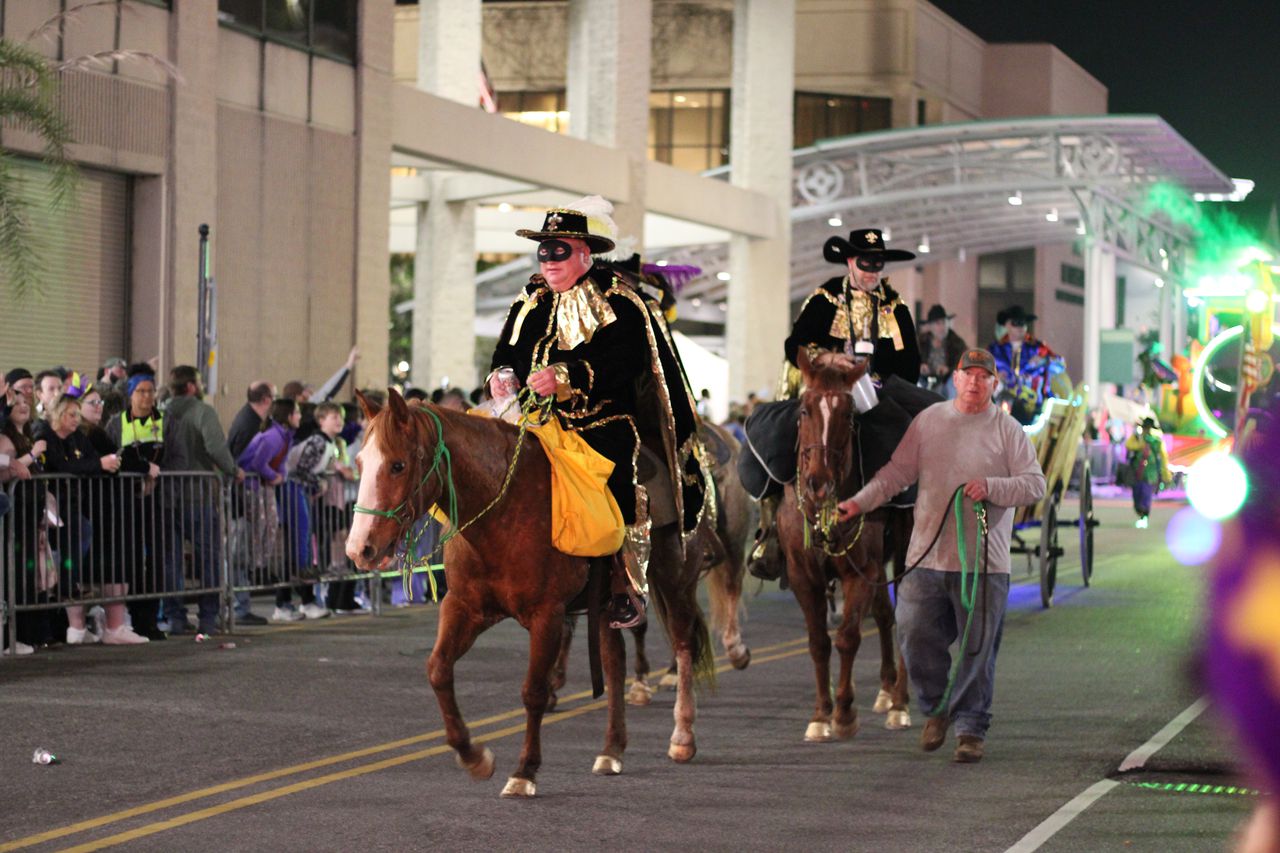Veterinarians offer support, advice to Mobile for horse treatment during Mardi Gras
A Mobile-based equine veterinary practice is offering its services to ensure another incident of a horse collapsing on a parade route does not happen again during this year’s Carnival season.
First Equine Veterinary Services, in a letter Monday to Mobile Mayor Sandy Stimpson and the City Council, said they were willing to volunteer their services to make sure the horses are healthy, that adequate weight restrictions of riders is in place, and to offer basic guidelines for riders and handlers.
The letter was written by Dr. Brittany and Dr. Patrick First, who own and operate what they say is the only exclusively equine veterinary practice along the Gulf Coast.
It was written three days after the Conde Cavaliers parade in which a horse collapsed along the parade route, only to get back up with the rider still on it. The horse’s handler was seen kicking and hitting the horse back to a standing position.
The incident was caught on cell phone video where it has since gone viral, sparking outrage at the Conde Cavaliers and the horse’s unnamed handler. The city’s Animal Services department and Mobile police continue to investigate.
“The City of Mobile and Mobile Mardi Gras organizations can, and should, do better,” the veterinarians said in the one-page letter. “People are watching.”
The veterinarians said they have noticed some issues with the contracted horses used during Mardi Gras parades, and included their concerns in the letter to Stimpson and the council:
- Horses that are too thin are repeatedly used for Marshals (riders). Lack of muscling along the neck and hind legs are proof these horses are too thin but that their conditions are frequently masked by decorative drapes, the letter says. The veterinarians say they typically recommend no more than 25% of the horse’s weight be occupied by the rider’s weight. “Any more than 25% is too taxing on the horse,” the letter reads. The rider in the Conde Cavaliers parade has been criticized for being too heavy to be on the horse, though the Conde Cavaliers say the costume worn by the Marshal made him appear to be too large and that he was below the size limits established by the horse’s owners.
- Over-sedation was a factor in the horse’s condition during the Conde parade, and remains “another issue we have seen repeatedly in years past,” according to the veterinarians. Excessive sedation can create a danger to riders and the crowds, though mild sedation “can be helpful to calm anxious horses.” There are other options, such as sensory clinics that are used to train and prepare horses for parades and situations they would encounter on the streets, the veterinarians said. Similar practices are used to train police mounted units. “Any horse used for crowd control must complete these clinics with success before being allowed on the streets,” the letter says. “Why should these parade horses be any different?”
- The handlers, hired by the stable supplying the horses, need to be appropriately trained to handle issues along the parade route.
The veterinarians, in their letter, chastised what was witness Friday along the parade route as “inappropriate and unethical.”
“When the horse went down, the marshal (rider) should have been instructed to dismount, and the horse should have been encouraged to rise before being escorted off route,” the letter says. “If the situation would have been handled correctly and responsibly, there would be less public outrage and negative publicity.”
Dr. Brittany and Dr. Patrick First, in their letter, said they are not opposed to using horses in parades. They, in fact, “encourage it.”
“Mardi Gras is a huge attraction and tradition for Mobile,” they said. “Horses should continue to be a part of that.”
James Barber, chief of staff to Stimpson, acknowledged the letter and advice from the veterinarians, and said he was appreciative of their willingness to volunteer their time to assist with handling of the horses before the parades.
“We’ve had issues with horses being spooked during parades, but this is the first time I’ve seen one just go down,” Barber said Tuesday following the Mobile City Council meeting.
Barber said he does not believe Mobile will look to end the use of horses during future parade years despite some social media comments that the city and the mystic societies that parade during the season should stop doing so.
“Horses are a part of Mardi Gras,” he said. “But we want to do so that it’s safe for the horse, safe for the rider, safe for the handlers and the people attending. We want to do it to ensure the safety of all involved, including the animal.”
Mobile City Councilman Ben Reynolds, who is a horse owner, said he was disturbed with what he saw from the cell phone videos taken on Friday. But he, like Barber, said the horses are not being removed from future parades.
“How ridiculous is that?” Reynolds said. “Horses have been a part of the culture of Mardi Gras for many years.”
He added, “There is a better approach toward this. I know there is a shortage of people supplying horses for these events. But hopefully, Mardi Gras organizations and horse handlers will take a better approach going forward. Everyone needs to pay better attention to what they are doing going forward.”
